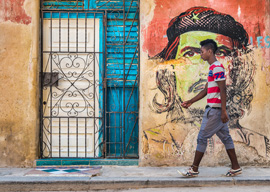
December 03, 2016

Havana, Cuba
Source: Bigstock
The admiration in the West for Castro and his appalling sidekick and potential rival, Ernesto Guevara, was essentially frivolous, more a question of style than of substance. Of course, much was made of free health care and free education, themselves frivolous phrases since health care and education are never free (only the air is free); but really it was the promise of eternal adolescence that the two revolutionary egotists held out that rendered them so attractive at a time when adolescence was regarded as the finest of the seven ages of man, all subsequent ages being those of decline from a peak.
If the photographer Alexander Korda had not snapped Guevara in an uncharacteristically romantic pose (usually he looked disheveled, unwashed, and as if he smelled), the cult would not have existed. This was a face that launched not a thousand ships, but a thousand T-shirts”not to say berets, badges, posters, coffee mugs, car stickers, and other items of kitsch. If I were dictator of the world, which happily for both the world and me I am not, I would make anyone guilty of wearing a Guevara T-shirt read twenty pages of his writings, which make those of Leonid Brezhnev seem like P.G. Wodehouse.
When I contemplate the printed acreage of praise of Castro in the past by Western intellectuals, I recall the words of Carlyle with regard to what he calls the gauchos of Paraguay:
These men are fit to be drilled into something! Their lives stand there like empty capacious bottles, calling to the heavens and the earth…”Is there nothing to put into us, then?”
Yes, of course there is: fantasies of omnipotence, fantasies of making the world anew, with us in charge.